|

Rambles in Kandy:
Unforgettable faces of a busy city
Aditha DISSANAYAKE
Two hours after I arrive in Kandy I step into an opticians and buy
myself a pair of sunglasses. The sun is so fierce overhead I find myself
squinting the way Clint Eastwood used to do in old Western movies.
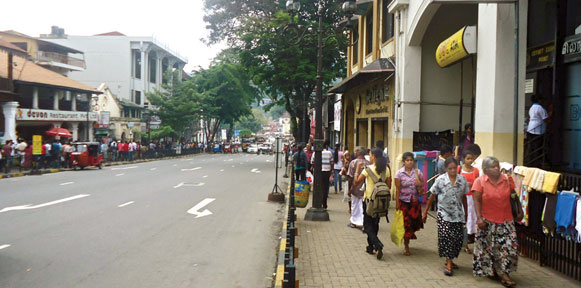 |
|
Saturday
morning Kandy |
The lady at the counter shows me an array of glasses ranging from
floral designs to aviators, to the hottest types to the coolest. I try
several and find myself being transformed into an Arnold Schwarzenegger
look alike, the twin of Mr. T and a Ninja Turtle in quick succession,
thanks to the black plastic frames. When I finally settle for a modest
pair which I hope does not change my ordinary appearance too drastically
the lady quickly packs it into a black plastic case. Then I ask the
price. Rs. X she says. Higher than what I expected, but I decide to go
ahead with the transaction. She consoles me saying if I am paying with a
credit card I will get a ten percent discount. I walk out of the shop
wearing my new glasses, into a surprisingly gloomy, semi dark street.
Where had the sun gone? Why did ten in the morning look like six in the
evening?
Growing up by the seaside in hot, humid Galle, I always imagined
Kandy to be a city as cold as Alaska. Sure, there was no snow but the
temperature would be near zero, people walked around wrapped in
mufflers, wearing the kind of overcoats spies wore on Tv and breathed
smoke from their mouths the way dragons do. An uncountable number of
moons later, I realized my imagination had been miles away from the
mark. Rarely did I spot a muffler and never a heavy overcoat on my
rambles along Kotugodalla Veediya or inside the legendary Bake House
cafe. The only consolation was the bit about the smoke. On chilly, sunny
days people did breath smoke through their mouths almost like the
dragons in Harry Potter.
One thing was for sure, I thought as I walked out of the opticians.
This was something I'd never done in Kandy before - had never even
imagined doing - and that was exactly why I was here today, to see what
new experiences I could encounter in a city I have visited every two or
three years since 1996. I knew Kandy, but not perfectly. I wanted to
discover more; to ramble through the streets as if this was my first
trip to this great city where History still lingers as if the Hantane
mountains are holding her in a tight embrace.
But today I decide to give history a break. Today I decide to make
friends with some "real" Kandyans. Avoiding the two main bus stands,
Goodshed and the one near the clock tower, and Torrington, the best
place to be if you are travelling on a budget , searching for nicknacks
for family and friends, and the Central market where you are bound to
find every edible vegetable ever discovered, I walk along the Dalada
Veediya.
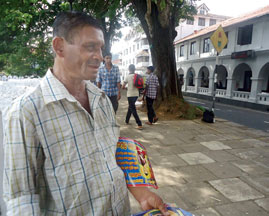 |
|
Stanely
with hisalmanacs |
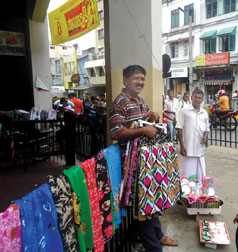 |
|
Samaratunga, over nineteen years on
Dalada Veediya |
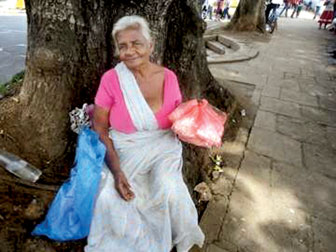 |
|
Abeymenike
with her flowers |
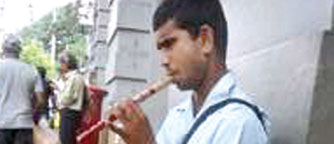 |
|
Kalum
singing for a few rupees |
My heart skips a beat when I see Kalum at the entrance to the
Cargills supermarket; the white cane leaning against the wall is a
forceful reminder of how lucky most of us are to be born with our
eyesight intact. His eyes half closed, his fingers moving rhythmically
over the flute, his head swaying gently from side to side, Kalum seems
to be in a world of his own as he stands at the busiest part of the
town.
I listen to the music recalling Nana Mouskouri singing "A sidewalk
rehearsal for nickels and dimes" till Kalum finally pauses for breath. I
ask him who had taught him to play the flute with such skill. "I learnt
to play by myself" he says, his eyes resting on the pavement. He was at
the school for the physically impaired "the madama" as he calls it, when
he was younger, but now lives with his brother in Pilimatalawa.
Every morning he makes his way to the town to collect a few rupees in
exchange for the soothing music he provides to the busy shoppers. He
says he never spends money on lunch because a kindhearted passerby
almost always donates a packet of lunch to him. "This money is important
to me" he explains. "I must collect enough to live on, when my brother
will no longer be there to look after me."
"Three quarter, half quarter, kotai, digai" the shouts of Samaratunga
over the mid morning traffic draw my eyes to the colourful pairs of
shorts hanging from the railings of the pavement on the other side of
the road, as if they have been newly washed and kept there to dry. "I
have been here on the pavement for over nineteen years" says
Samaratunga. "For the past ten years I have been selling these cotton
shorts for ladies".
Even though it is already eleven thirty in the morning he has not
been able to sell a single pair yet. "If I sell two pairs of shorts a
day, I feel I made a fortune" he smiles resignedly, then, brightening
up, asks me if I would like to buy one. Fate rescues me from this
predicament by sending two customers to him in the form of two teenagers
who giggle over the "kotai, digai" three quarter two quarter trousers
and decide to buy a pair each.
Samaratunga grins happily. He has already made his fortune for the
day. Then, realizing he had not sold me anything he begins all over
again. "How about this green and yellow pair? How about the pink and
blue pair?". But I see the glint in his eyes and hear the laughter in
his voice. "You brought me luck" he says as he waves me away.
The black grey fish lurking near the banks of the Kandy Lake, waiting
eagerly for a snack is a pleasing distraction from the busy streets on a
Saturday morning. "Don't dream of catching them" says a voice behind me.
I turn to see Stanley with his almanacs standing near me. Together we
gaze at the water, then he gives me a red grin revealing teeth stained
with betel juice.
"If you catch them the CID will come and take you away" he warns me.
Stanley says he lives in Ampitiya and makes a living standing around the
Wava Rauma selling almanacs to the visitors who come for a stroll round
the lake. "I earn around two hundred rupees a day" says Stanley. "My
wife works in a factory that manufactures umbrellas. We have four
children." He smiles. His eyes glisten with mischief. "It would be so
great to catch some of those fish and take them home for dinner".
"Leave those poor fish alone" says the lady seated under a tree with
bags of white flowers in her lap. She smiles at Stanley and me. "Fishing
is a sin." Stanley laughs and walks away searching for other customers
(he had made me buy not one but two almanacs). Abeymenike says she
cannot remember for how long she has been selling these bags of flowers
here in front of the Dalada Maligawa. "I remember I was here on the day
of the bomb blast. I am old now and my memory is not that good." She
lives in Mahaiyawa with her sister. "Both of us are unmarried." she
sighs. "If only I had got married when I was young...I would have my
children taking care of me now."
Every morning she plucks the white flowers growing around her house,
makes ten bags and comes to the Weva rawuma. A bag costs Rs. 20. "I
leave for home only after all the bags are gone. With the two hundred
rupees I earn my sister and I buy food and medicine". She shows me her
swollen legs.
"Don't worry, they have been like this for a long time" she assures
me seeing the look of alarm on my face. I leave Abeymenike with her
words of advice lingering in my ears. "Ikmanata kasada bandina eka
hondai" (It's good to get married as soon as you can.)"
I call it a day. I had wanted to see if it was possible to
re-experience Kandy as if for the first time. Through the new friends I
made (and the new pair of sunglasses), I realize I did just that. I had
seen a "new" Kandy.
[email protected]
International Day of People with Disabilities was on
December 3:
Let's give them their rights
Madhubhashini RATHNAYAKA
 United Nations International Day of People with Disabilities which
was on December 3 splashed many discussions and programmes. A friend of
mine who was an organizer of such an event told me he is not satisfied
with the public participation and also with the public awareness. United Nations International Day of People with Disabilities which
was on December 3 splashed many discussions and programmes. A friend of
mine who was an organizer of such an event told me he is not satisfied
with the public participation and also with the public awareness.
Manique Gunarathne, an executive in The Employer's Federation of
Ceylon, who was visually impaired in 2000 also pointed out that the
public awareness about people with disabilities is insufficient. She
holds many top positions in different organisations and contributes to
people with disabilities.
She has represented Sri Lanka in international context for about
fifteen times and has won three National awards including 'Diriya Kantha
Award' 2007.
According to the Protection of the Rights of Persons with
Disabilities Act, No.28 of 1996, persons with disabilities have been
defined as "any person who, as a result of any deficiency in his/her
physical or mental capabilities, whether congenital or not, is unable by
himself /herself to ensure for himself/herself, wholly or partly, the
necessities of life". According M D C. Jayamanne, Director of National
Secretariat for Persons with Disabilities the population of people with
disabilities in Sri Lanka is about 7 percent of the country's
population.
A proper methodology for recording comprehensive data on them should
be implemented. But many initiatives have been taken for the betterment
of the persons with disabilities which are like Sri Lanka. This is
becoming signatory to the United Nations Convention on the Rights of
Persons with Disabilities on March 30, 2007.
The legislation has been passed by the Disabled Persons
(Accessibility) Regulations, No. 1 of 2006 to bring it is mandatory to
be "accessible to all" creating a disabled-friendly environment.
This insists the need of ramps, specialised toilet facilities and
other ergonomically user friendly features to make public buildings
accessible for people with disabilities and the elderly. According to
Director of National Secretariat for Persons with Disabilities, it is
going to call for financial estimates to construct accessible facilities
in the government buildings for the persons with disabilities and then
planning to allocate financial provisions.
 He moreover says that the allowances for the persons with
disabilities given by the government will be increased. The housing
grant will be increased to one hundred thousand rupees to one hundred
and fifty thousand rupees. Self employment, medical, education
allowances and the number of families receiving the allowance paid to
families with persons with disabilities are also increased. The number
of families would be increased from 35 families to 50 families in a
Divisional Secretariat Division. When considering persons who became
disable by passed conflict, he told that, community based
rehabilitations programs are conducting especially in North and East.
Manique says that, with all these support definitely there should be
attitudinal change in the society about persons with disabilities. He moreover says that the allowances for the persons with
disabilities given by the government will be increased. The housing
grant will be increased to one hundred thousand rupees to one hundred
and fifty thousand rupees. Self employment, medical, education
allowances and the number of families receiving the allowance paid to
families with persons with disabilities are also increased. The number
of families would be increased from 35 families to 50 families in a
Divisional Secretariat Division. When considering persons who became
disable by passed conflict, he told that, community based
rehabilitations programs are conducting especially in North and East.
Manique says that, with all these support definitely there should be
attitudinal change in the society about persons with disabilities.
"We expect a change from sympathy to empathy, from dependence to
independence, from exclusion to inclusion. People help us with charity
based attitude by sympathizing. But what we want is our rights" Her
words imply there is a misconception in the society about people with
disability which is felt by them. What the people with disabilities
demand is not special focus on them, but accepting them. She moreover
mentioned "being a woman with disabilities is like double handicapped.
There is a judgment in the society that a women with disabilities is
unable conduct a good marriage life or unable to have children. But they
have right to marry.
And also though there are a lot of women organisations; they do not
munch concerned in inclusion of women with disabilities, but we do like
to be part of them." She also reminded that legislation ensures 3
percent of the workforce in public services has to be much more
considered by government and private sectors. But she also pointed out
English knowledge and computer literacy of the people with disabilities
should be improved to increase their working opportunities. She has
becoming strength to other persons with disabilities by giving them her
knowledge in Information Technology and English. "There are families
that do not tend to send the persons with disabilities to schools or
release them to the society though they like to mix with others."
It is time to change. Change the way you think about them. But they
think big. They have stable dreams. At least we should give them the way
to make the dreams real. |



